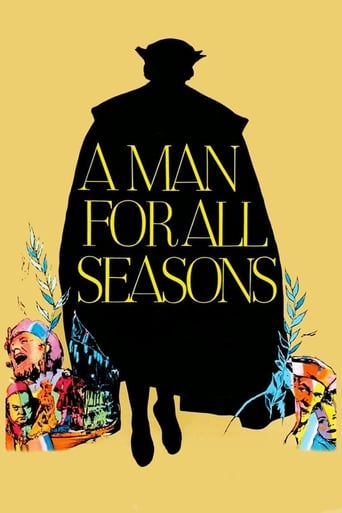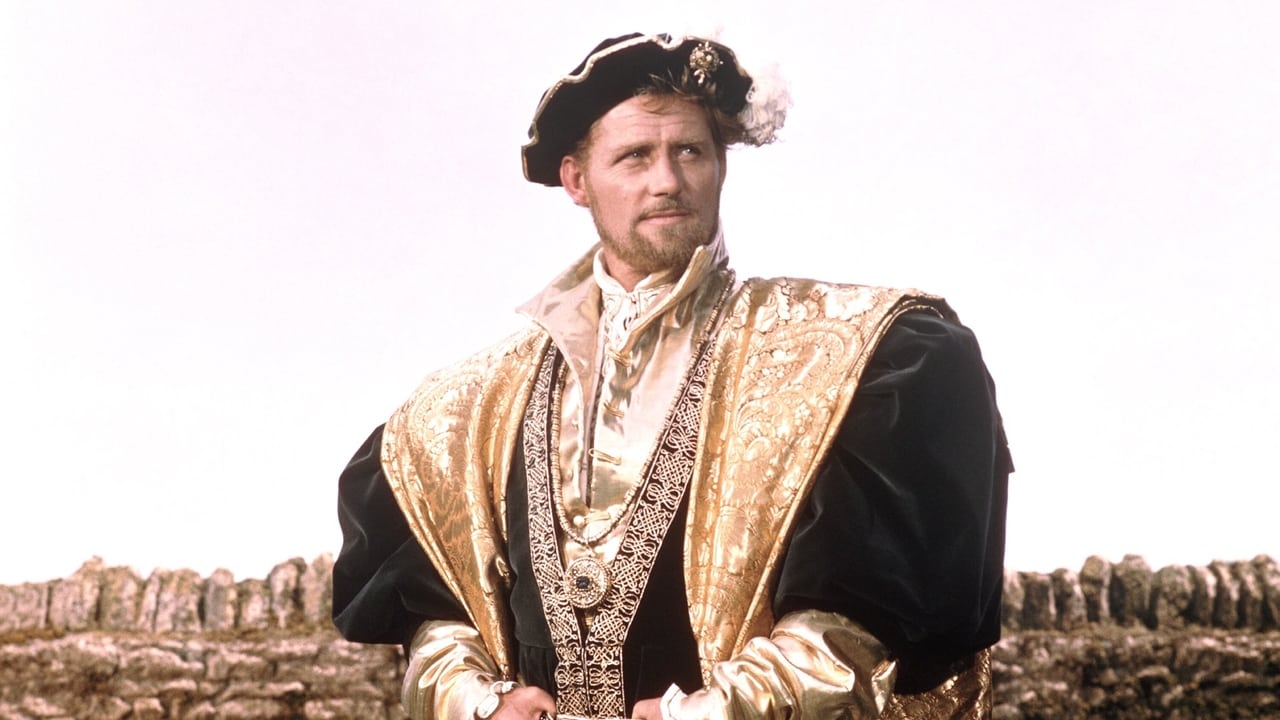gab-14712
My blunt response for 1966's A Man for All Seasons is that it's a great movie. The Academy voters seemed to agree with me back then because it was the Best Picture winner at the Academy Awards that year. The movie appealed to me because of a variety of reasons. I love the history background, and I learned some things about a time period I'm not too familiar with. Quite frankly, not many people know much about the events during the 15th and 16th centuries, and the topic of this movie is a major event. The film is about a man named Sir Thomas More who died because he believed in his principles on how to live a Catholic life, and unfortunately those principles clashed with the ideas of England's ruling figure, King Henry VIII. I also loved the performances in the film, especially from Paul Scofield who delivered an immense, emotional performance as More. Like all films trying to recapture the time period, I loved the look of the film. They seemed to have caught the basic grasp of what England looked like in the 1500's. Finally, the themes are worth watching this movie. It shows that a person should not be afraid to speak their beliefs, even if that results in persecution. The theme has always existed in reality and even more so in today's world with political beliefs, racial beliefs, and even sexual beliefs.To delve into the historical background of the movie is the same as describing the plot of the film so here goes. Sir Thomas More (Paul Scofield) is a very popular figure in England. The chancellor has a loving family which includes his wife, Alice (Wendy Hiller) and his daughter, Margaret (Susannah York). His king, King Henry VIII (Robert Shaw) is determined to break from the Roman Catholic Church because he wants to divorce his wife and remarry a different woman. More disagrees with the king's decision, and he respectfully resigns his chancellor post in hopes to live his life out as a private citizen. But the King has other ideas, and he wants a public announcement from More saying he agrees with the King. But More refuses, and his silence may be his biggest punishment of all. But also his silence shows that it can sometimes be louder than words.Fred Zinnemann's feature has excellent performances all across the board. In researching the making of the film, I discovered that the director, Zinnemann had to fight to get Paul Scofield to play Sir Thomas More. The producers originally feared he wasn't a big enough name for the general audience. It is a good thing they changed their mind because Scofield delivered the performance of the decade, and he had previous acting experience as the chancellor. He originally played More in plays at London's West End and on Broadway, earning him the Tony Award. Scofield went on to win an Academy Award for his portrayal of More. I enjoyed Robert Shaw's colorful performance as King Henry VIII. Some people say he overacts at time by screaming. It's true that Shaw screamed often in his limited screen time, but that was how the King acted in real life. Wendy Hiller does a fine job as More's loving wife who is also suffering due to her husband's silence. This film also opened the eyes of the pubic to John Hurt, who was an unknown at the time. Hurt played Rich, an assistant of Thomas More but later on double-crossed him. Orson Welles delivers a brief, but good performance as Cardinal Wolsey, the head cardinal of England.I really enjoyed watching the film and see all these fine performances take shape. The second half of the film is emotional. Those who knows their history knows that More was executed for his beliefs. His execution doesn't take place on the screen, but the persecution More faces due to his silence is heartbreaking. Back then, people were not given the freedom of speech or expression as we are lucky to have it today. More never objected to the king's actions. He just never said a word and he paid the price. In a sense, he was seen as a martyr. He could be one of the main influences on why humans today have the right to speak their mind.A Man for All Seasons is an excellent film for all the reasons I have mentioned in the review. The movie is more of a character-driven film thanks to the snappy screenplay adaptation by Robert Bolt, so do not expect much in the way of action. The screenplay is dialogue-driven, and I loved the words or in some cases, no words at all. It delivered a fresh breath of air to More and it informed modern audiences what happened 500 years ago and why it's important to know what happen. It's full of wonderful performances, especially the much-heralded performance of Scofield. The movie looks great, sounds great, and is just overall a great movie. Remember, never be afraid to speak your beliefs. You can believe whatever you want to believe, and that is what Sir Thomas More told the world in 1530.My Grade: A
Freedom060286
Although Paul Scofield's performance is Oscar-deserving, overall this one is not worthy of the "Best Picture" Academy Award it won. Some of the casting could have been better. Orson Welles appears drunk and does not play Wolsey nearly as well as Anthony Quayle in Anne of a Thousand Days. Leo McKern is not as convincing as Thomas Cromwell as was John Colicos in that movie. Robert Shaw gave a poor performance as Henry VIII - his spitting at the mouth during his loud ranting, and maniacal laughing at other times was over-the-top and made the ruthless but shrewd king appear to be insane. The comment at the end that Henry died of syphilis is not historically accurate. However, most of the rest of the cast (for example John Hurt) perform very well. History reveals Thomas More to be clever and pious, but also stubborn and self-righteous, so his portrayal in the movie is historically accurate. The movie is for the most part well- written and the cinematography is very good.
gigan-92
A Man for all Seasons is a 1966 film directed by Fred Zinneman. It tells the story of the final years of Sir Thomas More. Like Elizabeth, the film was praised and won an impressive six Oscars. It was an adaptation of a play written by Robert Bolt and this is important to note, unlike certain adaptations that would come years later. A Man for all Seasons sticks much, much, closer to the actual history. In fact, only very minor details were changed as opposed to the almost fantasy-like take on Queen Elizabeth. While both are great films, A Man for all Seasons has a little more of my respect because of this. Now to the movie's story.The film centers on Sir Thomas More, played excellently by Paul Scofield, who refuses to submit in the face of ever increasing pressure. More is portrayed as a man who adhered to his religion no matter the consequence. Interestingly enough, the DVD I purchased had the tagline "His silence was more powerful than words". At first, I had not a clue what that meant. After watching the film, I see now that the meaning behind it is really rather tragic. In the face of threats and endless persecution from his peers and King Henry VIII himself, More refused to crucify himself by openly declaring his reasoning. It was a clever way of going about it, but also sad in that a man had to resort to such tactics in the first place.Of course , in the end it is not enough to save the main character from the king's wrath. Unfortunately, he goes the way of the martyr. In so doing, however, he became an impeccable symbol of virtue and strength. By refusing to allow politics to mold his beliefs, Sir Thomas More became a testament to integrity. The movie's theme is wrapped up cleverly inn its very title. Sir Thomas More truly was a Man for all Seasons.
jvance-566-20403
Try to imagine a time when there was only one "Church", where diocesan/papal power was supreme and separation from the Church body was the one of the most terrifying punishments that could be meted out. And in this same time temporal kings absolutely believed that it was their divine right to rule with impunity over the masses.Combine these conditions with a transcendent confrontation between 2 of the most intricate and influential intellectual giants of the era and you've got the basis for a truly epic tale - and it's not fiction.Add a gifted modern playwright and a superb cinematic director and let them work their magic. The result is one of the finest dramatic expositions ever brought before the public.There are plenty of other commenters with details and technical observations far superior to what I could offer so I won't bother adding to them. I will say that if you figure there could be nothing remotely interesting or inspiring in a conflict between a narcissistic, power-mad potentate and a pious religious scholar you're absolutely wrong and missing out on a real opportunity.



 AD
AD





